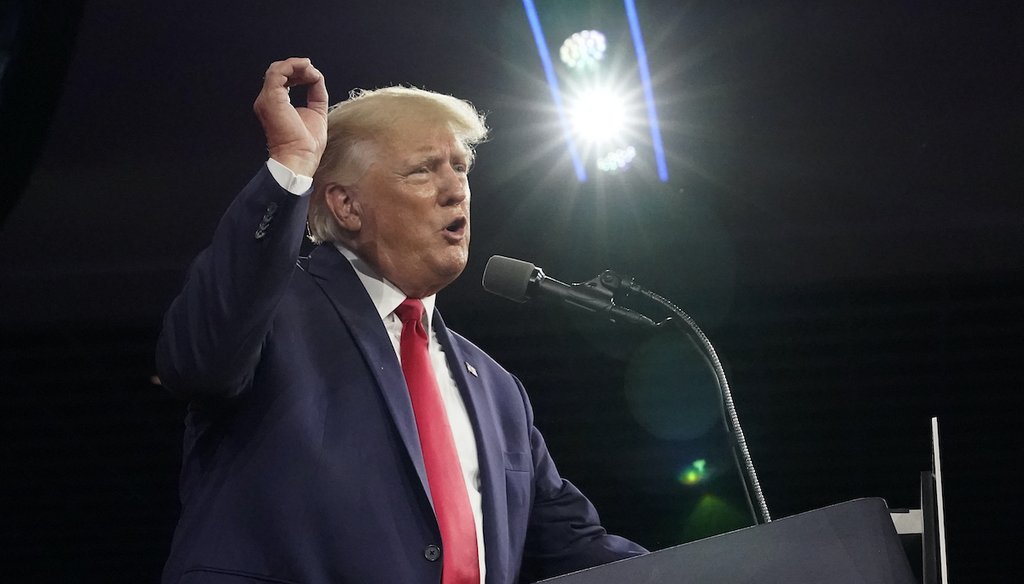Stand up for the facts!
Our only agenda is to publish the truth so you can be an informed participant in democracy.
We need your help.
I would like to contribute

Former President Donald Trump speaks at the Conservative Political Action Conference (CPAC) Saturday, Feb. 26, 2022, in Orlando, Fla. (AP)
If Your Time is short
-
The U.S. Constitution says presidential candidates must be citizens and residents of the United States for at least 14 years and at least 35 years old. It does not state that a criminal indictment or conviction prevents someone from running for president.
-
A separate section of the Constitution bans federal office holders who "engaged in insurrection or rebellion.” It was a condition added after the Civil War, but using it to keep today’s candidates off the ballot is a long shot.
-
Some state laws and constitutions bar felons from running for office, but that’s for state or local offices only.
Donald Trump has always been confident in his chances of winning over voters, even if he committed crimes.
"I could stand in the middle of Fifth Avenue and shoot somebody, and I wouldn't lose any voters, OK?" Trump said at a 2016 campaign stop in Iowa. "It's, like, incredible."
His comment at the time was seen as a joke. But now that Trump faces an investigation by prosecutors in Georgia and potentially the Justice Department, the idea that an indicted or convicted felon could run for president is no laughing matter.
A reader recently emailed us and asked if Trump could run for office if he were indicted or convicted of a crime.
This is in the news again since the Jan. 6 committee said in a March 2 federal court filing that Trump may have broken the law in his attempts to get himself declared the winner of the 2020 election after he lost to Joe Biden.
Sign up for PolitiFact texts
In Georgia, Trump is under investigation by Fulton County prosecutors who are probing whether he violated election laws after he asked state election officials to "find 11,780 votes, which is one more than we have."
The short answer is legally, it appears that Trump could still run for president, even if convicted of a crime.
"A criminal conviction does not prevent a person from running for president," said Barbara L. McQuade, a University of Michigan law professor and former U.S. Attorney. "The Constitution controls this question, and it makes no prohibition. States can decide their own rules for who is eligible to hold office within their own states, but they cannot disqualify someone from running for president."
What the Constitution says
We’ve explored this topic before in the context of whether a candidate could run for Congress from jail. We found that the U.S. Constitution upholds the principle that voters decide who shall represent them, and the qualifications are citizenship, age and residency.
Legal experts and political scientists have debated whether a separate part of the Constitution, Section 3 of the 14th Amendment, could keep Trump off the ballot. That section says that no person "shall be a Senator or Representative in Congress, or elector of President and Vice-President, or hold any office, civil or military" who had previously taken an oath to support the Constitution and then "engaged in insurrection or rebellion against the same, or given aid or comfort to the enemies thereof." That section was added after the Civil War.
Plaintiffs tried to use that section recently to keep U.S. Rep. Madison Cawthorn R-N.C., who spoke at a Trump rally just before the Jan. 6 attack, off the ballot for Congress. But a federal judge on March 4 blocked that effort. Using the section to block Trump’s candidacy is a long shot, too.
Convicted felons have run for president in the past. Lyndon LaRouche was convicted in 1988 of tax and mail fraud conspiracy and ran for president multiple times between 1976 and 2004. LaRouche first ran as part of the Labor Party and later as a Democrat.
Eugene Debs was convicted of violating the Espionage Act of 1917 for an anti-war speech then ran for president as a socialist from a federal prison in Alabama in 1920. Debs’ supporters handed out campaign buttons for "Prisoner 9653." The candidate who beat Debs, William Harding, commuted Debs’ 10-year sentence.
U.S. Constitution trumps state laws for presidential qualifications
There are provisions in state constitutions and laws that say persons convicted of felonies can’t run for office, but that only applies to local or state candidates.
When Arkansas tried to enact term limits on federal offices in 1992, for example, the measure was struck down by the courts.
Arkansas voters had adopted a state constitutional amendment that banned U.S. House or Senate members who had served a certain number of terms from running for re-election. The amendment was challenged, and in 1995 the U.S. Supreme Court held in U.S. Term Limits v. Thornton that states could not add qualifications for congressional candidates. The qualifications enumerated in the Constitution are exclusive, said Derek Muller, a University of Iowa law professor and expert on election law.
"There is general agreement that this extends to presidential candidates, too," Muller said. "That means a state cannot prohibit indicted or convicted felons from running for president."
The rationale behind this is to prevent states from driving presidential selection by imposing additional qualifications that would become, potentially, a patchwork few candidates could meet or could be manipulated to enable some states to collude to disqualify candidates, said Rebecca Green, a William and Mary election law professor.
"As to the question of why the Constitution does not prohibit those with criminal convictions running for president, part of the rationale may have been to prevent states from criminalizing certain activities as a means of gaming eligibility," Green said.
But the idea that someone indicted or convicted of felonies could hold the highest office in the country is something that may not have been envisioned.
"The drafters of the Constitution never imagined that anyone would run for president after a criminal conviction or that anyone would vote for them," McQuade said.
RELATED: The Jan. 6 committee’s court filing: How important is it?
RELATED: Unpacking the theory that the 14th Amendment could keep Donald Trump out of the Oval Office in 2024
Our Sources
U.S. Constitution, Article II Clause 5
U.S. Supreme Court, U. S. Term Limits, Inc. v. Thornton, 1995 ruling
Smithsonian Magazine, When America’s Most Prominent Socialist Was Jailed for Speaking Out Against World War I, June 15, 2018
Lawfare blog, A Practical Path to Condemn and Disqualify Donald Trump, Jan .22, 2021
Slate, Can Trump Run for President From Prison? May 26, 2021
NPR, Conspiracy Theorist And Frequent Presidential Candidate Lyndon LaRouche Dies At 96, Feb. 14, 2019
WRAL, Judge blocks effort to keep Cawthorn off NC ballots, March 4, 2022
Washington Post, 100 years ago, a president forgave his opponent’s alleged subversion, Jan. 6, 2022
PolitiFact, What Trump told Georgia election officials, March 16, 2021
PolitiFact, Can a convicted felon run for Congress from jail? June 25, 2013
Email interview, Barbara McQuade, law professor at the University of Michigan and former U.S. Attorney for the Eastern District of Michigan, March 4, 2022
Email interview, Rebecca Green, William & Mary law professor, March 4, 2022
Email interview, Derek Muller, University of Iowa law professor, March 4, 2022
Email interview, Barry Burden, University of Wisconsin political science professor, March 4, 2022




































